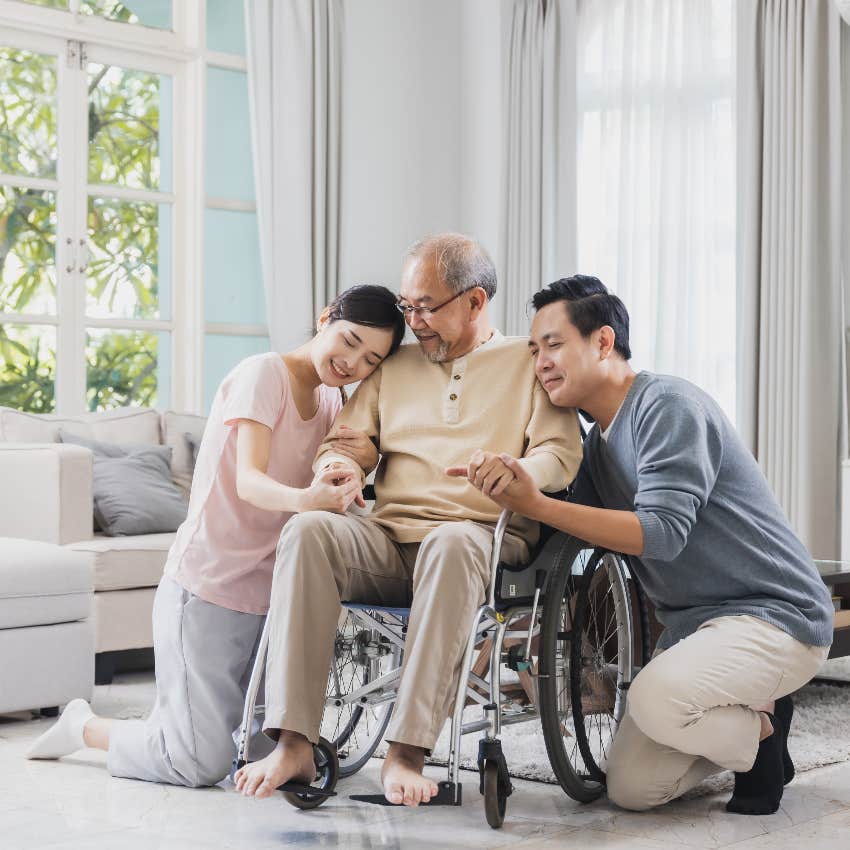How Caregiving For My In-Laws Led To A Strange Discovery About My Marriage
Taking care of my wife's aging parents led to some unexpected realizations about our relationship.
 vectorfusionart | Shutterstock
vectorfusionart | Shutterstock The instant the wheels on our flight from Tampa to JFK touched down, my wife Jen and I turned on our phones. We both had voicemails from her parents and as soon as we listened to the messages, we realized that we would be grabbing our luggage from the baggage carousel and flying right back to Tampa.
My wife Jen is an only child, and in 2002 her parents moved from their long-time home on Long Island to Lakeland, Florida. Jen’s dad, Garfield, was 72, and her mother Linda was 64. They had planned on moving someplace warm when the time was right.
Their first few years in Florida were typical — they got annual passes to Disney, spent time visiting friends who had moved to the area, and generally just enjoyed their retirement. Jen and I would visit as often as time allowed. She works in telecommunications in the banking industry, and I’m a self-employed entertainer and writer. Since we didn’t have any kids, we were free to come and go as we pleased, and there was always a room at her parents’ place for us.
Around 2010, her parents started having health issues.
Linda would periodically have bouts with atrial fibrillation that would land her in the hospital, and Garfield was having problems with his back, later diagnosed as spinal stenosis and scoliosis. As time went on, the hospital visits became more frequent, and when we visited, we would notice things that seemed off: food in the fridge that was long past its expiration date, and tasks that should have taken a few minutes ended up becoming all-day affairs. We realized that her father was having difficulty with his memory, and we became increasingly concerned.
By the summer of 2015, things seemed to be coming to a breaking point. Linda called to let us know that Garfield had fallen in the kitchen, she hurt herself trying to help him up, and they both ended up in the hospital. Jen and I grabbed a flight down, but by the time we arrived, they had already been discharged. We spent a few days in Lakeland, trying to assess the situation, and knew that the current arrangement wasn’t going to work much longer.
We flew home to New York — our usual plan was to get a 6 a.m. flight from Tampa to JFK, and when we landed, Jen would grab the Air Train from JFK to Jamaica station, then take a train to work in Manhattan. One of the amazing things about commuting from Long Island to New York City was that there were days that Jen could get to work faster from Tampa than she could from our home in Suffolk County.
When we landed on this particular flight, we had a voicemail that Linda was back in the hospital yet again, so we grabbed our bags off the carousel and flew right back to Tampa. During the three-hour flight, we had a frank discussion about the situation and mutually agreed that her parents were no longer able to take care of themselves safely.
Our options were limited — we could move in with them, they could move in with us, they could move into an assisted living facility, or we could do nothing and hope for the best.
In the 38 years Jen and I have been together, one of the things that works for us is that we both have a very good ability to quickly assess a situation and reach a mutual conclusion. We both instantly knew when we were house-hunting that the house we picked was “the one”; we bought cars within a matter of minutes; and I knew by our third date that I wanted to marry her.
We both realized that the only reasonable choice was to ask her parents to move in with us. We didn’t reach this decision lightly, and neither of us had any illusions that it was going to be fun or easy, but there was no alternative.
 Photo: Khwanchai stocker / Shutterstock
Photo: Khwanchai stocker / Shutterstock
When we arrived back at her parents’ house, we told her father our plan. He was very grateful and agreed that things were not working out very well in Lakeland. He was totally on board with the idea, and all that remained was to see what Linda’s thoughts were on the subject.
We got to the hospital and Linda was physically better, but very concerned about her inability to care for Garfield. When Jen told her our plan, she wanted to pack her bags and move in immediately. We told her it would take about three months to renovate our house to make the space suitable. We converted our den and my office into a bedroom and sitting room and converted our laundry room into a bathroom and walk-in shower. The remodel gave her parents privacy but allowed us to help them as needed.
After Garfield and Linda moved in, Garfield was diagnosed with Alzheimer’s, and from 2016 through his passing in June 2019, caring for them became increasingly challenging. Garfield’s personality changed, and he became combative and aggressive at times. After his passing, things quieted down substantially, and as of this writing, we continue to take care of Linda, whose condition deteriorated substantially after a hip fracture in Sept. 2022.
A study by Caring found that among adults who are caregivers to aging parents:
- 80 percent of baby boomers reported strains on their relationships.
- 46 percent of baby boomers stated that caregiving damaged their romantic relationships.
- 25 percent of divorced baby boomers said caregiving played a major role in their divorce.
When Jen and I took on the role of caregivers, we didn’t know these statistics, but we did realize that our former carefree life was going to change dramatically. For anyone considering taking on the challenge of caring for an aging parent, here are a few tips that may help your relationship from becoming a statistic.
Here are 5 tips to help your relationship while caring for aging parents:
1. Make certain it’s truly a mutual decision
In our case, we both realized that there was no good alternative and in many ways, it made things easier.
Since Jen doesn’t have any siblings, there was no debate about what to do or who would have to take responsibility. We knew that neither a nursing home nor even assisted living would be something her parents would consider, and they would have insisted on living alone in their home rather than moving into a care facility.
If one partner has any doubts, it’s vital to communicate them to the other partner before committing to a plan of action. You don’t want to find out a year or two into things that your partner didn’t want to make this choice but was too timid to speak their mind.
2. Ask for help
While Jen doesn’t have any siblings, she does have a few very close cousins, and I’ve got four siblings. At various times, we’ve asked all of them to help in one way or another. We have a relative who’s a contractor, and he supervised the renovation of our home, which worked out tremendously. Other relatives have been called on to stay with Linda so Jen and I can get a little time alone. Speaking of which…
3. Make time for each other
After being married for so long and not having any kids, Jen and I were used to being the center of each other’s attention. On weekends we used to leave the house in the morning and spend the day doing whatever we wanted.
Once her parents moved in, our lives revolved around taking care of them — doctor’s appointments, cooking meals, and tending to their needs. It would be very easy to let things slide, and there were times we neglected each other because of the demands of caregiving. It takes a conscious effort to maintain the romance, but we both made that effort to keep our marriage on track.
4. Find the humor
I grew up in a family that joked about everything and anything, and I have a personal philosophy that any situation that doesn’t end up with someone dead, no matter how bad it may be at the time, will eventually be a great story to tell. The key is mentally getting yourself to that point while the awfulness is happening.
Whenever things got too stressful, we tried to find the humor in it. We weren’t always successful, but more often than not, there’s a speck of something funny in almost every terrible situation.
5. Realize it’s not forever
It sounds grim, but sooner or later, everyone passes away. While things may not be ideal in the here and now, Jen and I are actively planning what we will do when her mother is no longer with us.
One of the interesting things about being childless is that you don’t have the same reminders of the passage of time that people with kids do. Every lost tooth or school recital is a subtle reminder that time is always on the march. We don’t have those reminders, and it allows me to mentally deny that I’m getting older.
In many ways that’s great, but it’s also very easy to lose track of how much time has passed by and what time you’ve got left. Having Jen’s parents move in with us was in some ways like a reset button on our lives, forcing us to come to terms with our aging and allowing us to plan how we want to spend the rest of our own time together.
Terry Parrett is a freelance writer and stage hypnotist. He has performed at comedy clubs and casinos around the U.S. and has headlined in Las Vegas, Reno, Lake Tahoe, and the Gulf Coast.

